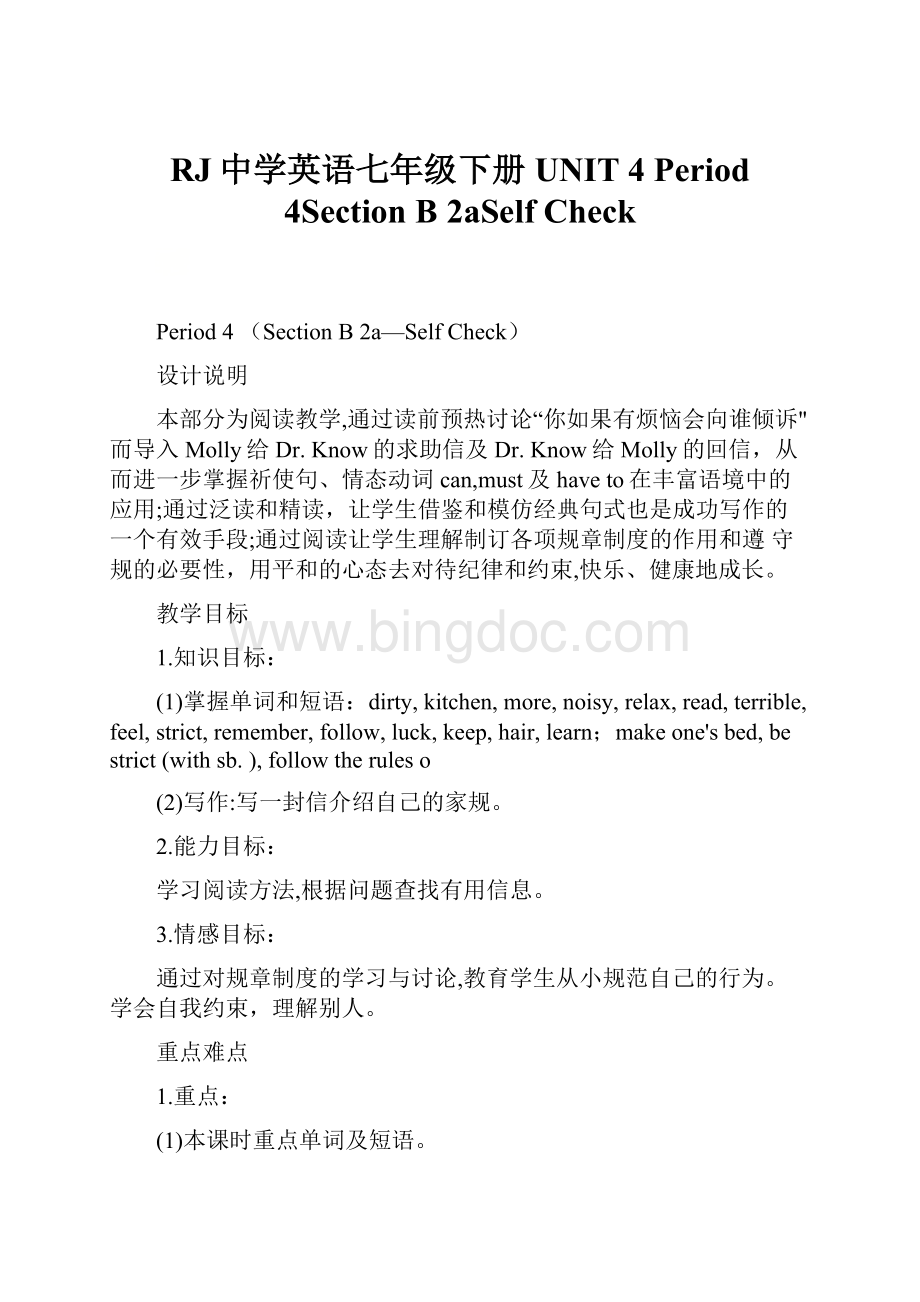RJ中学英语七年级下册UNIT 4 Period 4Section B 2aSelf CheckWord文档格式.docx
《RJ中学英语七年级下册UNIT 4 Period 4Section B 2aSelf CheckWord文档格式.docx》由会员分享,可在线阅读,更多相关《RJ中学英语七年级下册UNIT 4 Period 4Section B 2aSelf CheckWord文档格式.docx(12页珍藏版)》请在冰点文库上搜索。

T:
Pleasetakeoutyourhomeworkandtellustherulesinyourhouse.Whocan?
S1:
...
S2:
T:
Welldone.Whatwillyoudoifyouareunhappy?
Willyoutalktoyourparents,talktoyourgoodfriendsorwriteyourfeelingsdowninyourdiary?
Iliketotalktomyaunt.
Iliketotalktomybestfriend.
S3:
Iliketotalkto...
OK.Asforme,IliketotalktoDr.KnowwhenI'
munhappy.He'
sgreatandheknowseverything.Hecangiveyouthebestadvice.Now,let'
sworkon2bandlet'
smeetDr.Know.
Step2Presentation
1.Showsomepicturesonthebigscreen.Teachthenewwords:
dirty,kitchen,noisy,relax,read,terrible...
2.Learnthenewwords.Andtrytorememberthem.
3.TranslatethewordsintoEnglish.
脏的dirty
厨房kitchen
放松relax
可怕的terrible
头发hair
学习learn
记住remember
感受feel
运气luck
Step3Reading
1.Fastreading.
TherearemanyrulesinMolly'
shomeandschool.Shefeelsunhappy.Readtheletterandfindtheanswertothisquestion:
WhatdoesMollyfeelabouttherules?
Thestudentsreadtheletterandfindtheanswertothequestion.
(Shefeelsterrible.)
2.Carefulreading.
(l)ReadMolly'
sletteragain,andfindoutherfamilyrules.Andthenfillherrulesinthechart.
(2)Checktheanswers.
Answers:
2.Shecan'
tleavethedirtydishesinthekitchen.
3.Shecan'
tbelate.
4.Don'
tbenoisy.
5.Don'
teatinclass.
6.Shecan'
tplaybasketballafterschool.
7.Shemustdoherhomework.
8.Shecanplayonlyonweekends.
9.ShemustreadabookbeforeshecanwatchTV.
10.Shehastogotobedbefore10:
00.
(3)ReadDr.Know'
sletter,andunderlinehispointsofview.Thenaskthestudentstodiscusstheirownopinions.
3.Askthestudentstodiscusshowtowriteletters.Sumupasfollows:
(1)称呼:
Dear×
×
(2)称呼后通常用逗号,不用冒号,这是中英文信件的区别之处。
(3)求助信中的核心句一般放在开头,如“Therearetoomanyrules!
”。
主题句后就是解释说明主题句的细节句。
(4)信件结束前一般会有明确求助的句子,如:
WhatcanIdo?
(5)结尾处署名:
求助人姓名
4.Readtheletterscarefullyandtranslatethefollowingphrases.
(1)toomanyrules太多规则
(2)makeyourbed整理你的床铺
(3)leavedirtydishesinthekitchen把脏的餐具留在厨房里
(4)havemorerules有更多规则
(5)don’tbenoisy不要吵闹
(6)can'
trelax不能放松
(7)readabook读书
(8)bestrict要求严格
⑼makerulestohelpus制订规则来帮助我们
(10)followtherules遵守规则
5.Workingroups.
(1)also,too与either辨析
①also是较正式的用语,通常用于肯定句,位于连系动词be、助动词或情态动词之后,实义动词之前,意为“也”。
②too多用于口语,语气较随便,一般用于肯定句或疑问句,常位于句末。
③either意为“也(不)”。
一般用于否定句,且常位于句末。
用too,also或either填空。
Idon'
tlikebananas.Hedoesn’tlikebananas,either.
Icanlistentomusicintheclassroom,too.
Theyalsohavefishshopsinthatsmalltown.
(2)toomany,toomuch与muchtoo
toomany后接可数名词的复数形式;
toomuch后接不可数名词;
muchtoo后接形容词或副词。
用toomany,toomuch或muchtoo补全句子。
Toomanyrulesandtoomuchhomeworkmaymakethestudentsmuchtoobored.
(3)leave与forget
leave后接表示地点的介词短语,构成“leave+宾语+地点状语”结构,表示“把……(某物)忘在……(某地)”;
forget后不能接表示地点的介词短语,但其后可接动词不定式todosth.作宾语,意为“忘记做某事”。
用leave或forget补全句子。
Don'
tleaveyourhomeworkathomeeverytimeandneverforgettobringittoschoolwhenyoucomeback.
(4)more是形容词many或much的比较级形式,意为“更多”,其后接复数名词时为many的比较级,其后接不可数名词时为much的比较级。
(5)noisy为形容词,由名词noise去掉e后加y构成,意为“吵闹的”。
其反义词为quiet。
tbenoisyinclass.Bequiet,please.
课堂上不要吵闹,请保持安静。
6.Readthelettersagainandcompletethesentencesin2c.
1.can'
t,can2.must/hasto3.must/hasto,can4.can'
t5.haveto/must
7.Discussthefollowingquestions.
(1)Whichrulesdoyouthinkarefair?
(2)Whichrulesdoyouthinkareunfair?
(3)IfyouwereDr.Know,whatwouldyousaytoMolly?
Theanswerswillvary.
Step4Writing
1.CompleteZhaoPei'
slettertoDr.Knowin3ausinghaveto/must,canorcan"
t.
2.Checktheanswers.
Can,haveto/must,haveto/must,haveto/must,can'
t,haveto/must,can'
t,haveto/must,can
3.Readtheletteraloudandtrytoremembertheseexpressions.
keepmyhairshort留短发
learntoplaythepiano学习弹钢琴
havefun过得快乐
4.T:
Wehavemanyrulesathomeandschool.Thinkaboutwhatthingsyouhavetodoandwhatthingsyoucan'
tdo.Completethechartin3bwiththerulesinyourhomeandschool.Writesomeoftherulesandsharetheminclass.
5.WritealettertoDr.Know.Tellhimaboutalltherulesandhowyoufeelaboutthem.
[写作指导]
1.先对3b中自己所写的在家及在校的规则进行整理,将在家里的规则及在学校里的规则分别放在一起。
2.先将在家里的规则写成一段连贯的文字,再将在学校里的规则写成一段连贯的文字,之后表明自己对这些规则的感受。
3.注意开头可写"
Canyouhelpme?
”来表明自己求助的目的。
并注意写清自己求助的原因。
4.按书信的写作格式,写好开头及结尾,并将整个信件通读一遍。
Onepossibleversion:
DearDr.Know,
I'
mnothappybecauseIhavetoomanyrulesathomeandschool.Ican'
tmeetmyfriendsorwatchTVafterschool.Ihavetodomyhomeworkeveryday.Ihavetogotobedbeforeteno'
clockintheevening.Ihavetowearschooluniformsonschooldays.Idon'
tlikethembecausethey'
reugly.Ican'
teatintheclassroom.Ihavetoeatinthedininghall.Ihavetobequietinthelibrary.
Ineverhavefun.WhatcanIdo?
Step5SelfCheck
WorkonExercise1.
1.Askthestudentstoreadthewordsinthebox.
2.Fillintheblankswiththewords.
3.Checktheanswers.
Answers:
arrivelate,benoisy,listento,isstrict,followtherules
WorkonExercise2.
Usecan,can’t,haveto/mustanddon'
ttowriteabouttherulesatschool.Writetwosentencesforeachrule.
2.Listentotheteacher.Wemust/havetolistentotheteacher.
3.Wemustnotbenoisyinthelibrary.Wecan'
tbenoisyinthelibrary.Don'
tbenoisyinthelibrary.
4.Wemust/havetospeakEnglishinEnglishclass.
5.Eatinthedininghall.Wehaveto/musteatinthedininghall.
Step6Summary
Inthislesson,wehavelearned:
1.Newwords:
dirty,kitchen,more,noisy,relax,read,terrible,feel,strict,remember,follow,luck,keep,hair,learn.
2.Phrases:
sbed,bestrict(withsb.),followtherules.
3.Writing:
Aletteraboutfamilyrules.
当堂达标
(一)单项填空
1.Ican'
trelax?
A.tooB.alsoC.eitherD.neither
2.Therearetoomanyinthekitchen.
A.vegetablesB.milkC.bookD.rice
3.Onschoolnights,Ihavetogotobed9:
A.onB.inC.beforeD./
4.Tomalwayshishomeworkathome.Sohisteacherisveryangrywithhim.
A.forgetB.forgetsC.leaveD.leaves
5.Nancydoesn'
tgetupsoearlyontheweekend.
A.needB.havetoC.mustD.can
(二)根据汉语提示完成句子
1.Myfatheroften(清洗餐具)afterdinner.
2.Wecan’t(出去)onschoolnights.
3.Tom'
smotheriscooking(在厨房里).
4.Mymother(对我要求严格)athome.
5.Youhaveto(留短发)atschool.
6.Ihaveto(遵守规则)atschool.
7.Ihaveto(学会阅读).
8.Shecan'
twatchTV(晚饭前).
(三)阅读理解
RuleOne
(1)Youcancomeintotheroomwithyourteacher.
(2)Don'
teatordrinkintheroom.
(3)Don'
tlistentomusic.
(4)Bequiet.Don'
ttalktoeachother.
(5)Tumoffallthecomputersandclosethewindowsafterclass.
RuleTwo
HerearetherulesforEmily.
(1)Youmustgetupbefore6:
30a.m.
ttalkloudlyonthephone.
(4)Gotobedbefore10:
00p.m.
(5)Youcan'
tmeetfriendsifyoudon'
tfinishyourhomework.
(6)Cleanyourbedroomyourself.
1.isn'
tallowed(不被允许)ineachofthetworules.
A.EatingintheroomB.Listeningtomusic
C.MeetingfriendsD.Comingintotheroom
2.WhendoesEmilyhavetogotobed?
A.After10:
00p.m.B.Before6:
30p.m.
C.Before10:
00p.m.D.Before9:
00p.m.
3.RuleOnemaybefora.
A.computerroomB.classroom
C.bedroomD.diningroom
4.Theunderlinedword“finish”means“”inChinese.
A.阅读B.拿走C.开始D.完成
5.WhichofthefollowingisNOTtrue?
A.Youhavetobequietwhenyouhaveacomputerclass.
B.Emily'
sparentscleanherbedroom.
C.Studentscan'
tgointotheroomifthereisnoteacher.
D.RuleTwoisalistoffamilyrules.
答案及解析:
(一)1.Ctoo意为“也”。
一般用于肯定句句末,常用逗号隔开;
also意为“也”。
用于肯定句,它通常放在句中,位于实义动词之前,连系动词之后,如有助动词或情态动词,一般放在助动词或情态动词之后;
either意为“也(不)”。
一般只用于否定句,且常置于句末;
neither意为“两者都不”。
分析题干可知,该句为否定句,应用either,故选C。
2.Atoomany“太多”,修饰可数名词复数。
四个选项中只有A项为可数名词复数。
句意为“厨房里有太多蔬菜”。
3.C句意为“在上学日的晚上,我必须在9点之前上床睡觉”。
4.Dleave意为“留下;
落下”。
常与表示地点的介词短语连用,构成“leave+宾语+地点状语”结构,表示“把某物忘在某地”。
本句主语是第三人称单数,因此选D。
5.Bneed作实义动词应在其后加to;
can,must都是情态动词,变否定句时,可在其后直接加not,故选B项。
(二)1.doesthedishesdothedishes清洗餐具。
主语myfather是第三人称单数,故填doesthedishes。
2.gooutgoout“出去”。
3.inthekitcheninthekitchen“在厨房里”。
4.isstrictwithmebestrictwithsb.“对某人要求严格”。
5.keepyourhairshortkeepone'
shairshort“留短发”。
6.followtherulesfollowtherules“遵守规则”。
7.learntoreadlearntodosth,“学会做某事”。
8.beforedinnerbeforedinner“晚饭前”。
(三)1.B两个规则中都有“Don'
tlistentomusic.“。
2.C由RuleTwo中“Gotobedbefore10:
00p.m.”可知答案。
3.A由RuleOne中“Tbmoffallthecomputersand...”可知答案。
4.D由句意“你如果完不成作业,就不可以约见朋友”可知,finish意为“完成”。
5.BA项符合RuleOne中第(4)条;
C项符合RuleOne中第
(1)条;
从RuleTwo中可以看出D项正确。
由RuleTwo中第(6)条可知B项错误。
Step7Homework
1.Revisethenewwordsandphrasesinthisunit.
2.Retell2b.
板书设计
UNIT4Don'
dirtystrict
kitchenremember
morefollow
noisyluck
relaxkeep
readhair
terriblelearn
feel
sbedbestrict(withsb.)
followtherules
Therearetoomanyrules!
tle